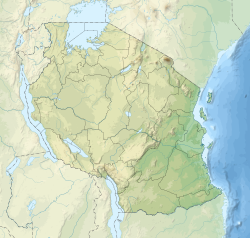| Location | Karatu District, Arusha Region, |
|---|---|
| Region | Eastern Africa |
| Coordinates | 3°32′18″S 35°17′48″E / 3.53833°S 35.29667°E |
| Type | Settlement |
| History | |
| Abandoned | Late Stone Age |
| Periods | Middle Stone Age & Late Stone Age |
| Site notes | |
| Excavation dates | 1934, 1936 & 1938 |
| Archaeologists | Ludwig and Margit Kohl-Larsen, M.J. Mehlman |
| Condition | Excavated |
| Ownership | Tanzanian Government |
| Management | Antiquities Division, Ministry of Natural Resources and Tourism [1] |
| Public access | Yes |
| Official name | Mumba Cave |
| Type | Cultural |
Mumba Cave, located near the highly alkaline Lake Eyasi in Karatu District, Arusha Region, Tanzania. The cave is a rich archaeological site noted for deposits spanning the transition between the Middle Stone Age and Late Stone Age in Eastern Africa.[2][3] The transitional nature of the site has been attributed to the large presence of its large assemblage of ostrich eggshell beads and more importantly, the abundance of microlith technology. Because these type artifacts were found within the site it has led archaeologists to believe that the site could provide insight into the origins of modern human behavior.[4] The cave was originally tested by Ludwig Kohl-Larsen and his wife Margit in their 1934 to 1936 expedition. They found abundant artifacts, rock art, and burials. However, only brief descriptions of these findings were ever published. That being said, work of the Kohl-Larsens has been seen as very accomplished due to their attention to detail, especially when one considers that neither was versed in proper archaeological techniques at the time of excavation.[5] The site has since been reexamined in an effort to reanalyze and complement the work that has already been done, but the ramifications of improper excavations of the past are still being felt today, specifically in the unreliable collection of C-14 data and confusing stratigraphy.[4]
- ^ "Antiquities Division". Retrieved 21 Jul 2022.
- ^ Prendergast, Mary; Luque, Luis; Domínguez-Rodrigo, Manuel; Diez-Martín, Fernando; Mabulla, Audax; Barba, Rebeca (2007). "New Excavations at Mumba Rockshelter, Tanzania". Journal of African Archaeology. 5 (2): 217–243. doi:10.3213/1612-1651-10093.
- ^ Barham, Lawrence; Mitchell, Peter (2008). The First Africans: African archaeology from the earliest toolmakers to the most recent foragers. Cambridge University Press.
- ^ a b Gliganic, Luke; Jacobs, Zenobia; Roberts, Richard; Dominguez-Rodrigo, Manuel; Mabulla, Audax (2012). "New Ages for Middle and Late Stone Age deposits at Mumba Rockshelter, Tanzania: Optically stimulated luminescence dating of quartz and feldspar grain". Journal of Human Evolution. 62 (4): 533–547. doi:10.1016/j.jhevol.2012.02.004. PMID 22425240.
- ^ Mehlman, M.J. (1979). "Mumba-Hohle Revisted: The Relevance of a Forgotten Excavation to Some Current Issues in East African Prehistory". World Archaeology. 11 (1): 80–94. doi:10.1080/00438243.1979.9979751.

